With more than 65 billion clients to take data from, Facebook is one of the greatest focus of programmers. Programmers are attempting to hack into clients records to take individual data, spam advertisements and offers or basically to keep an eye on somebody vital. Simply take a try at scanning for “Hack Facebook Account” on Google and you will see many sites offering Facebook account hacking administration. Regardless of whether these administrations are genuine or not is another story but rather in all actuality, there are many approaches to hack a Facebook account and an expert programmer can without much of a stretch hack a normal client’s record who has less learning about record security.
Table Of Content
- Identify if your Facebook account is hacked or not
- Take action on Facebook warning
- Suspicious Activity
- Login Sessions
- Recover account and change the password
- Change password and gain back access to your account
- Go through the security check
- Secure your Facebook account
- 1. Add a Phone Number
- 2. Add Login Approval Security
- Few Ways Hackers Can Hack Your Account
All things considered, the reality remains that there are many individuals hoping to hack Facebook accounts and on the off chance that you think your record is hacked, you may be correct yet there is no compelling reason to check. We are here to guide you through the entire procedure of recognizing if your record is hacked and afterward recovering it, and after that make a point to take care of its security.
Identify if your Facebook account is hacked or not
- If you think that someone is trying to intruder on your Facebook account while staying low, you can try the following ways to identify if your account is hacked or not.
Take action on Facebook warning
- If Facebook finds any suspicious activity or login to your account, it will send you a notification telling you to secure your account. Don’t overlook this and immediately take action by following the below mentioned two ways:
Suspicious Activity
- The person who has hacked your account is most probably using it for some purpose, like spamming your friends or posting ads everywhere. If you find any activity that you didn’t perform, then there is a good chance your account is hacked. The best way to see all your activities is to click on the“drop-down” button on the top right corner of the Facebook page and then click on “Activity Log” from the menu.
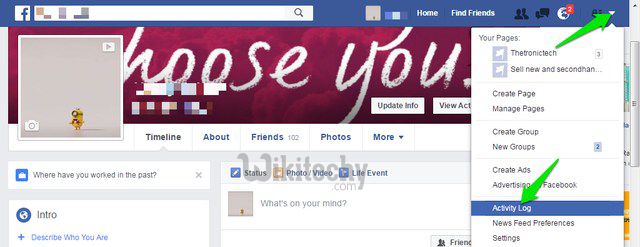
- This will open a page where you will see all your recent activity. If you find any activity that you don’t remember doing, then your account is hacked. Check out the the next tip to further confirm this.
Login Sessions
- Facebook keeps a complete log of all your account sessions from any device. You can check these sessions to see if your account is being logged in from a device that you don’t recognize or place you did not visit.
- To access login sessions, click on the “drop-down button” again and select “Settings” from the menu.

- Then, head over to the “Security” settings, where you should see different options to secure your account. Here, click on “Edit” next to the “Where You’re Logged In” option.
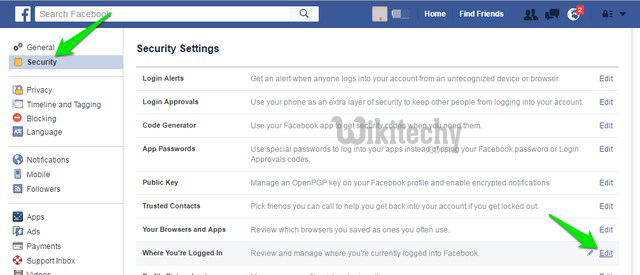
- You should see your current session and all your previous sessions from different devices. You can see location of the device (based on IP address) and device operating system and browser. Here, make sure to check if there’s any session that you don’t identify. If you find any, immediately click on “End Activity” next to it and follow the instructions that we have mentioned below to change password and secure your account.
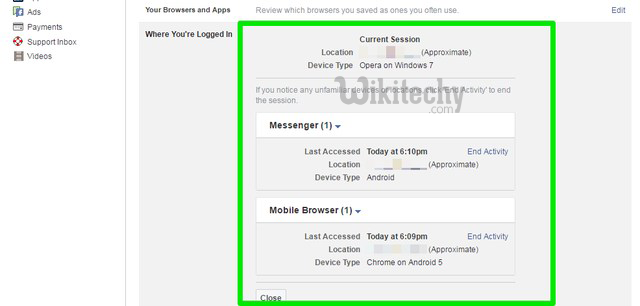
Recover account and change the password
- There are two scenarios: either the hacker will just keep track of your activity silently or he/she will kick you out of your account and change the account credentials to lock you out of your account. Here’s what you need to do in any scenario:
Change password and gain back access to your account
- In case the hacker has changed your Facebook password and you are locked out, you can easily recover it using your email address connected to your Facebook account. On Facebook login page, click on the “Forgotten Account?” button.

- In the next page, you need to help Facebook find your account. To do so, you can enter your email, phone number (if attached), username or you can even use your full name to find and recover your account.
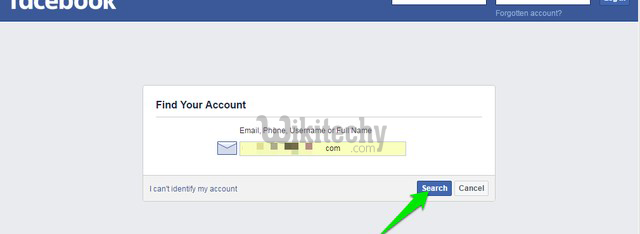
- Once you have found your account, Facebook will show you multiple options to reset your password and gain back access. Here, you can either get a link to reset password to your email address or get a code on your phone to change the password. Use any of these options to easily reset password and gain back access.
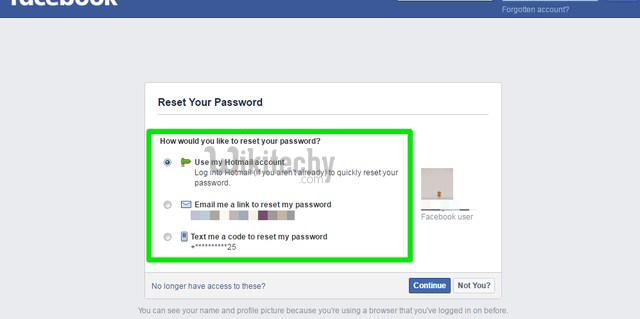
- It’s all easy, but the problem arises when you don’t have access to your email address(like if it’s hacked as well) and you didn’t add a phone number or don’t have access to it for some reason.
- In that case, click on the “No longer have access to these?” button at the bottom in the password reset page.

- In the next page, Facebook will recommend you to reset password for your email address and also provide you links to the sources of popular email services that can help you reset the password. Just like Facebook, we are recommend you to try and reset password of your email address and gain access to it, as it’s the easiest way to gain back access to your Facebook account. However, if you can’t access your email by any means, then click on the “I cannot access my email account” button at the bottom.
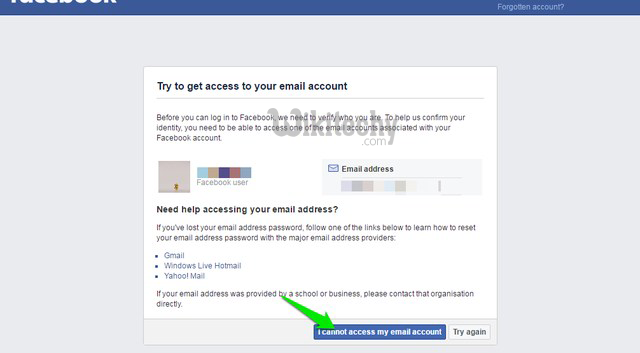
- Facebook will then ask you to enter any email address that you have access to, so that Facebook can contact you through it to resolve the issue. Enter your email address and click on “Continue”.
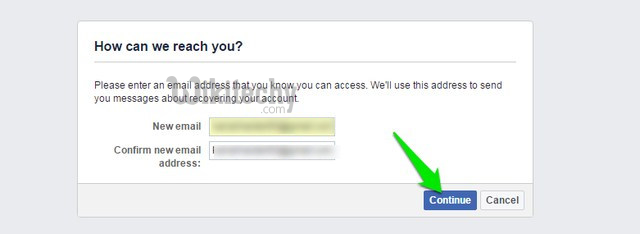
- In the next page, you need to provide an official Government ID or two non-Government IDs with your name, photo and date of birth clearly visible (must match your Facebook information). You can provide passport, national ID card, birth certificate and other similar documents that could prove your identity. To upload the document, take a picture of it or scan it and upload it using “Choose File” button. Once uploaded, Facebook will verify and help you recover your account using the email address you just gave to Facebook to connect with you.
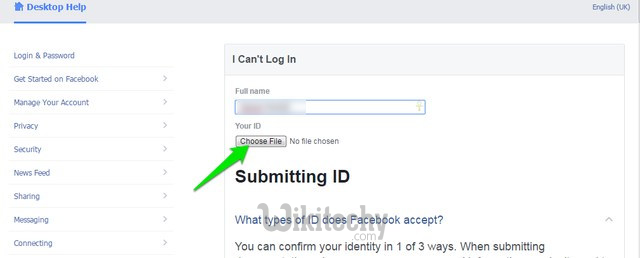
Go through the security check
- Now that you have recovered your account and have access to your hacked account, you need to ensure that your account doesn’t get hacked again. There are many ways to secure your Facebook account, but we are recommend you to use Facebook’s compromised account feature that should make you go through all your security options again, so that your account is never at risk again. Don’t worry, it’s an automatic process and doesn’t involve you personally talking to Facebook support.
- First, go to Facebook’s “Report Compromised Account” page and click on “My Account is Compromised” (make sure you are already logged in).

- Then, Facebook will let you enter your current password or the old password to continue. Make sure you enter your current password and not an old one, the old one will just start the password recovery process that we went through above.
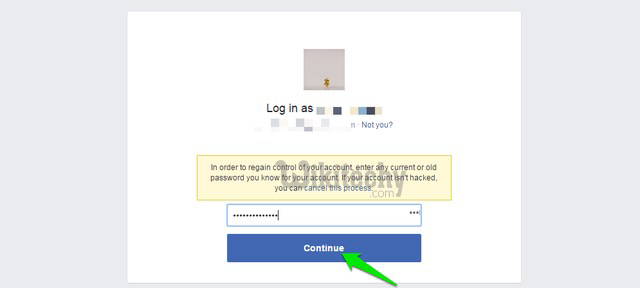
- Once entered, click on “Get Started” and Facebook will make you go through 4 steps to secure your account. While doing so it will also log you out of all the devices and will not allow you to use Facebook without going through these processes. The processes are explained below:
1.Change Password:Just create a new password that is strong and contains letter, numbers and characters. You can use a Password Manager to help remember it.
[ad type=”banner”]
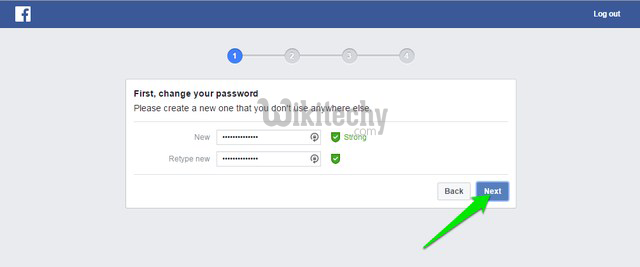
2.Get Rid of Recently Added Apps:A hacker may add an app that could be used for spamming or showing ads even when you have taken control of the account. If you see any apps here that you did not add, simply remove it.

3.Remove Recent Activity:This will show all your recent activity and let you remove the ones that were not done by you.

4.Setup Login Alerts:When this is set up, you will get a notification whenever someone accesses your account from a different browser or device. This is the perfect way to ensure that you always know what is happening with your account.
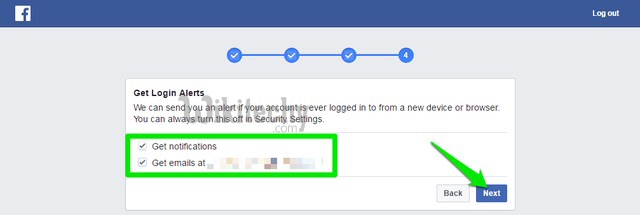
- The above process should be enough to recover your Facebook account totally after getting hacked while ensuring the hacker doesn’t strike again. However, Facebook security isn’t limited to just this, so keep on reading and secure your account further.
Secure your Facebook account
- We are listing down some tips you can follow to tighten up Facebook account security. You don’t necessarily have to apply these security measures, but if you are concerned about your account’s security and don’t want to take any risks, then follow these tips:
1. Add a Phone Number
- Adding a phone number is one of the best ways to secure your account. It will let you easily recover your account even if your email is hacked and also let you use Facebook’s 2-step verification. To add a phone number, go to Facebook Settings and head to “Mobile” settings from the left menu and click on “Add a Phone”. Now, just follow the instructions to add and confirm your phone number.

2. Add Login Approval Security
- Login Approval Security is the 2-step verification process of Facebook that will let you login to Facebook with your password and also a code sent to your phone. To set it up, go to FacebookSettings again and click on “Security”. Here, click on “Edit” next to “Login Approvals” option and check the checkbox next to “Require a security code”.

- Then, click on “Get Started” on the prompt and confirm your phone number to add this security. Whenever you or someone else tries to access your account from a different device, they will have to provide the code sent to your phone to gain access.
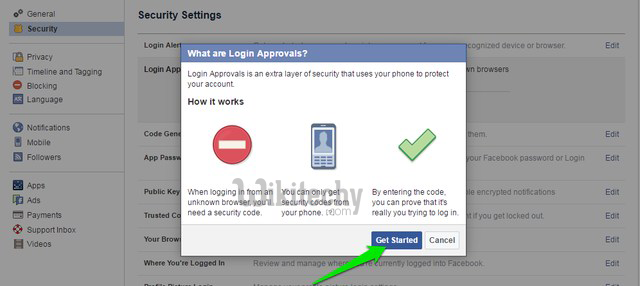
Few Ways Hackers Can Hack Your Account
- Here are a few ways hackers can hack your account, check them out to make sure you take the right measures.
- Phishing Sites:Hackers can create a fake Facebook login page and when you enter your details there, it will be sent to the hacker instead of Facebook. Phishing attempts are usually made through emails and other modes of communication. If an untrusted person gives you a link to access Facebook through it, don’t do it. Your browser may also give a warning to not enter.
- Keyloggers:Keyloggers are software that can log the keystrokes you make on your keyboard, therefore stealing your username, password and other sensitive info when you type it. Usually they are installed with shady programs, but hackers can remotely install it as well, if they get access to your PC. Thus, use a good antivirus program to identify and stop keyloggers and try to use password managers like Lastpass to automatically enter passwords instead of typing them with your keyboard.
- Never Give up your Password Yourself:Many scams may ask for your Facebook login details in order to give you gifts, game coins and other incentives. Never give up your information even if a so-called Facebook employee asks for it.


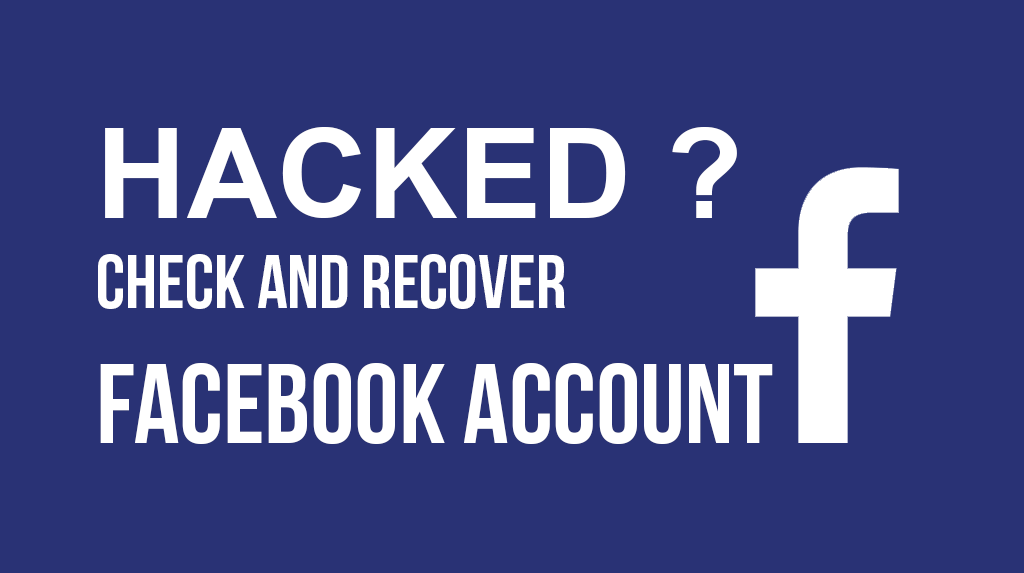




I am eager to learn hacking